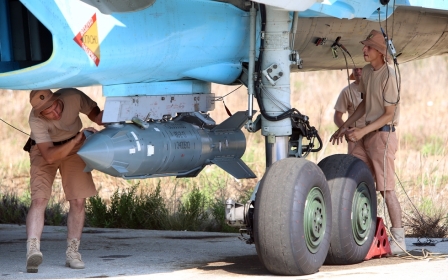At least 35,000 displaced from Aleppo as Russian bombing continues

Tens of thousands of people have been displaced from southwestern Aleppo since last week, the UN Office for the Coordination of Humanitarian Affairs (OCHA) said. The organisation said that it could confirm that 35,000 people had been displaced so far.
Half of those were forced to move from their homes in the Hader and Zerbeh towns on the outskirts of Syria's second city and many are now living with host families or in informal settlements nearby, said Vanessa Huguenin, a spokeswoman from OCHA.
“People urgently need food and basic household and shelter items," Huguenin said. "In addition, aid agencies are growing more concerned for families living outdoors as the weather is getting colder especially overnight.”
However, medical staff from local organisations working in the area said that at least 70,000 people are thought to be on the move in the southern Aleppo countryside.
350,000-strong exodus by the weekend?
Turkish security sources have now also claimed that they expected the number of refugees leaving Aleppo province to increase to 350,000 by the weekend if the airstrikes continue, with a number of these people being expected to reach Turkey’s border, Turkish opposition daily Hurriyet reported on Wednesday.
Syria Turkmen Council President Abdurrahman Mustafa also confirmed 50,000 people have left the city and were heading to Turkey.
“A major migration has started from the south of Aleppo. Turkmens are in the rural and northern part of the city. The migration will be larger when the regime forces reach here," he told Hurriyet.
"In the Bayırbucak neighborhood, clashes are harsh. Bayırbucak Turkmens are stuck between al-Assad forces and Russia and ISIL fighters," he said, using another acronym for the Islamic State militant group. "Turkmens are fighting on these three fronts.”
In addition to fleeing residents, the only two hospitals in southern Aleppo were targeted by Russian air strikes, forcing all patients, including several newborn babies, to evacuate, according to the Syrian American Medical Society on its website.
The hospital in the al-Hader neighbourhood - the largest in the area - sustained a direct hit, while the second facility was damaged, but no one was injured. They have been shut down indefinitely.
Around 350,000 civilians are dependent on the hospitals, SAMS said, and the damage sustained “severely hinders their access to basic and life-saving medical care".
Dr Zaidoun al-Zoabi, head of the Union of Syrian Medical Relief Organisations, said the Syrians whom his organisation found in the Aleppan countryside had "no medical support".
"We saw only people who do not have even tents, any shelter, whatever. People were asking for some food, sandwiches even," he said.
"The shelling is so fierce. The sky was filled with jet fighters, with helicopters, and people are terribly scared. They are scared to death."
Aleppo, Syria’s former economic hub, has been divided in half since 2012 with government troops controlling the western half, and the opposition groups controlling the east.
The push for Aleppo
On 17 October, the Syrian government, with the reported support of fighters from Iran and Lebanon’s Hezbollah militia and Russian air strikes, launched a military campaign against the opposition groups in Aleppo, pursuing the southern and western areas.
The joint command for the operation addressed residents and said that the military action was necessary “to liberate you from the armed terrorist groups”.
The operation is the fourth since Russia joined the Syrian fray on 30 September, with government forces seeking to re-establish full control over Homs, Latakia and Hama. At least 100,000 Syrians are thought to have been displaced since these attacks began, according to the Syrian Observatory for Human Rights.
The UK-based monitor said that at least 370 people had been killed, including more than 120 civilians, as a result of more than 500 air raids that Russia has carried out in support of Assad.
During the attacks, the 400-kilometre stretch from Latakia to Aleppo has been targeted repeatedly. Syrian government forces are also keen on controlling the Aleppo-Damascus highway, which has been the scene of fighting between the Russian-backed Syrian army and opposition groups.
Correspondents from the Anadolu Agency on the ground have reported that these opposition groups have tried to fend off Syrian government forces along a 5 to 15 kilometre stretch of the Latakia-Aleppo highway with limited logistics. In addition, the rebel groups are fighting the Islamic State group north of Aleppo.
Russia insists that it is aiding Syrian president Bashar al-Assad’s troops in the fight against IS, but the US and its allies accuse Russia of targeting opposition groups, some of which are backed by Washington and Ankara.
Stay informed with MEE's newsletters
Sign up to get the latest alerts, insights and analysis, starting with Turkey Unpacked
Middle East Eye delivers independent and unrivalled coverage and analysis of the Middle East, North Africa and beyond. To learn more about republishing this content and the associated fees, please fill out this form. More about MEE can be found here.




